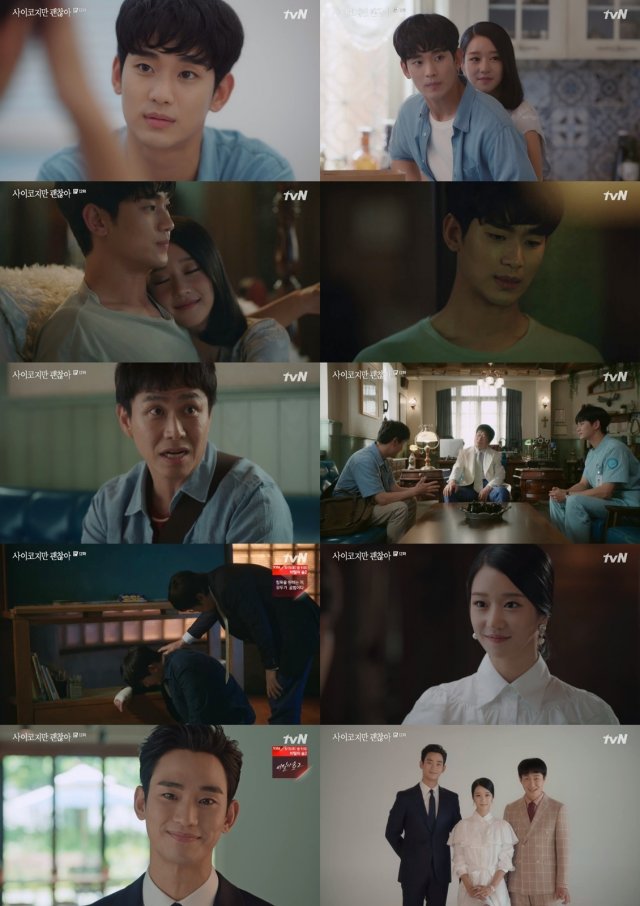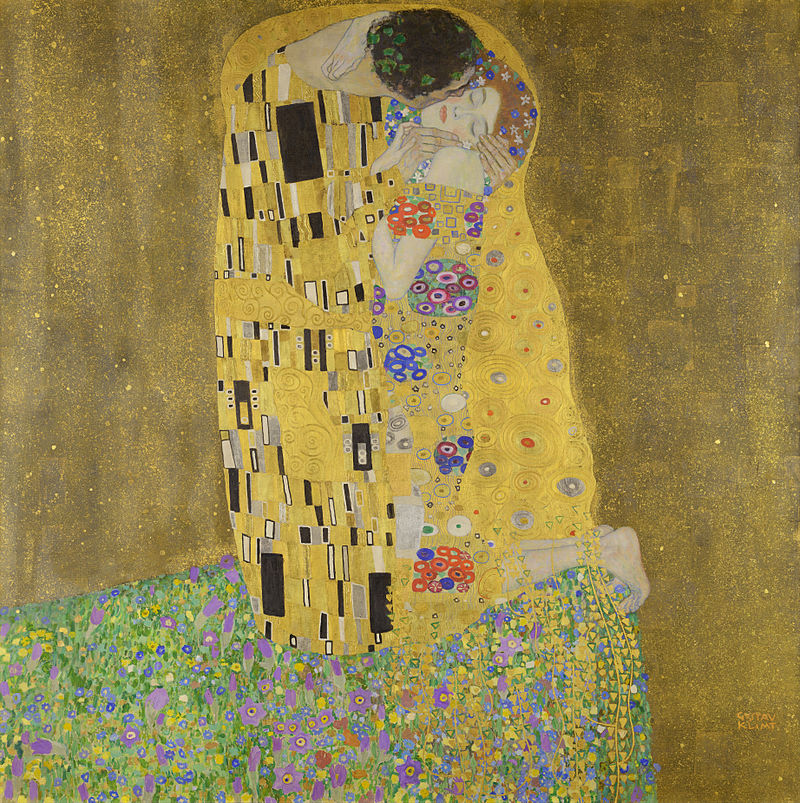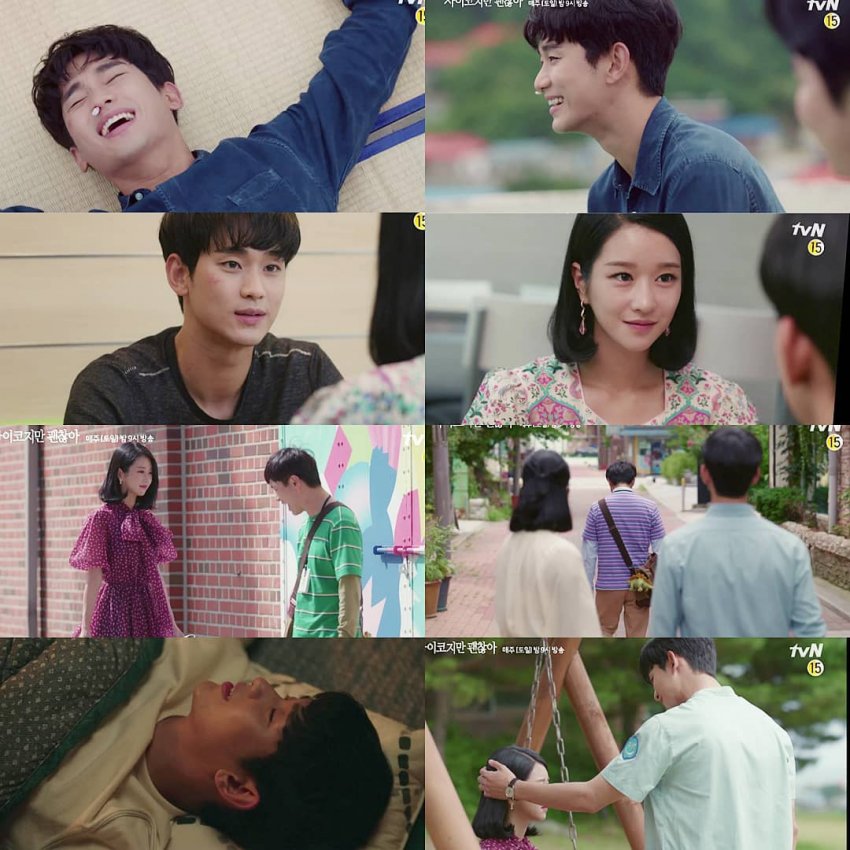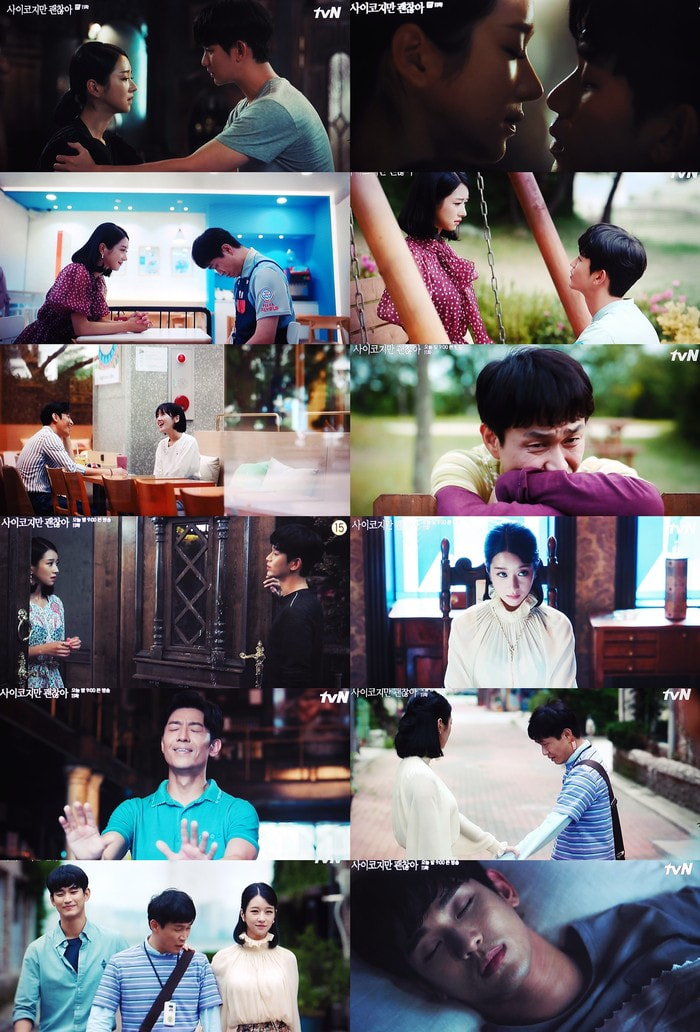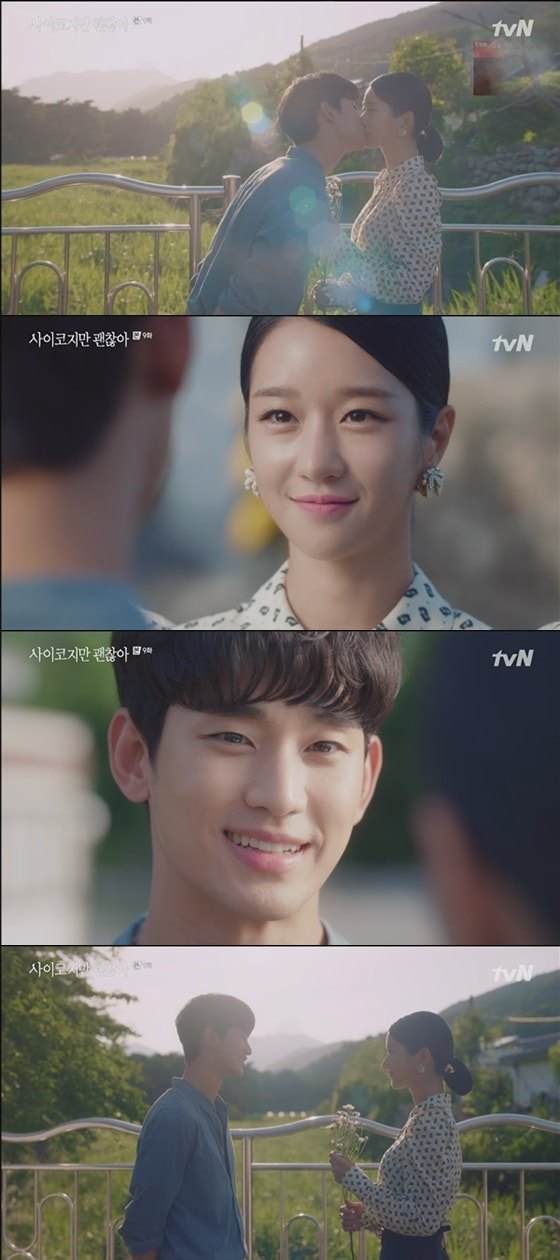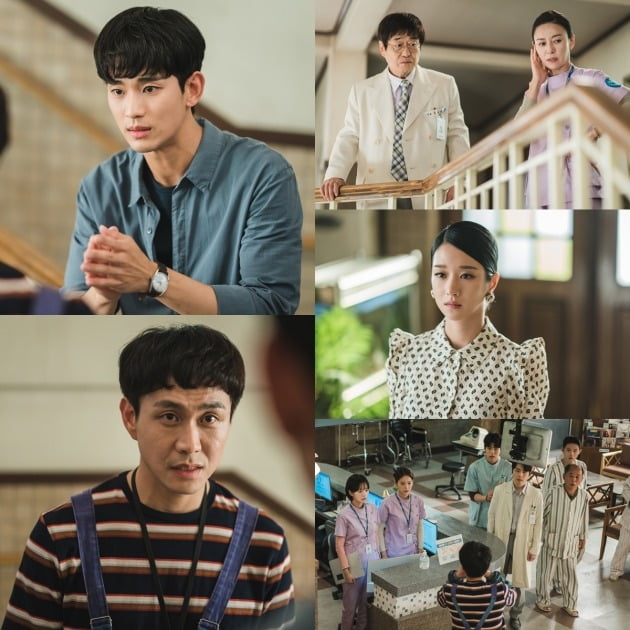Any theory that I postulate about the denouement of this drama ends up looking like a lumpen sack of incongruous bits. Even though I may have to bury my head in the sand in the end, here I go.
0 Comments
How many times I may watch the kiss scene, it will be still stupefying. This scene and the following romantic comedy serve as a salve for the heartbreak in store for the triad.
|
KT's despair is dark and deep, but MY spares no effort in embracing him and his burden. | What is the dark secret buried in Ko, Dae-Hwan? Why did he try to kill his wife and daughter? |
A Day of Escapade, One Kiss, and an Implosion
When KT embraces his onetime escapade with MY and his love for her, infantile dependency and a survival instinct pressure ST to lash out at KT, piling up accusations of parricidal wishes. Abysmal in an emotional level, the scene of KT's collapse forms a stark contrast with the upbeat optimism that earlier opened this episode, yet I hope ST's confrontation with his fear of abandonment ultimately serves as growing pains.
(Ko, Dae-Hwan's narrative is not convincing in my eyes. Even if MY's mother is a monster who kills, that should not give him the right to dispatch her and condemn his daughter to the same fate.)
The backdrop of this episode is a well-known Korean parable about a barber who purges his explosive secret by whispering it in a bamboo forest--"the king has donkey ears!" |
Kim, Soo-Hyun as Moon, Kang-Tae (KT)
Seo, Yea-Ji as Ko, Moon-Yung (MY)
Oh, Jung-Sae as Moon, Sang-Tae (ST)
Spring comes again to Moon, Kang-Tae who has acquiesced to becoming the keeper of his brother. But this spring brings the girl from his buried memories back to his life and she starts to prod and pierce him, demanding him to reclaim his heart. In It Is Okay to Not Be Okay, we are treated with the Theatre of Cruelty, romantic comedy, Gothic-comic horror, murder mystery, and psychotherapy. In sum, this drama is a hefty knife that slices layers of tissues so swiftly that only after it is lodged next to your rib cage you would know what has happened.
A children's story writer, Ko, Moon-Yung insists on exposing the cruel, painful reality that, according to her, makes fairy tales a true vehicle of life lessons. Even though poignant and resounding, her gruesome characters and enigmatic moral invite sensationalism and scandal that complicate her career. Yet, it is her lack of empathy that helps others come to terms with their own desires. How would she open Kang-Tae's heart and in turn let it heal her own wounds?
| | |
Setting: early spring in Seoul
Ep 1: MY tells a story about a boy who was haunted by nightmares and failed to feel happy even after making a pact with a witch. She urges her readers to carry on while facing their nightmare. Will KT decide to face his trauma and ultimately become happy? KT's first "I liked her" was a belated confession; his second "I liked her" was closure.
Ep 2: Sang-Tae has an episode at MY's book signing and MY tilts the balance by attacking ST's attackers. Later, MY strikes at a venal literary critic and KT calms down MY by teaching her the butterfly hug method, a breathing method trauma patients can use, and bids her another good bye. MY puts on red shoes to pursue KT in her own way and heads for Sung-Jin. (The plot thickens: why does Jae-Soo insist on accompanying the Moon brothers whenever they move to a new town? What happened to MY's mother?)
Setting: Okay Psychiatric Hospital, Ju-Ri's house, and MY's mansion in the City of Sung-Jin
Ep 3: After this episode, I will no longer deny my girl crush on the actor Seo, Yea-Ji--she is just phenomenal in this episode. MY is drawn to the sanatorium. MY steals an amulet to ward off her nightmare and returns to the accursed castle of her childhood. MY starts teaching a literary class at the clinic and ST works on a mural. Psychotherapy Case 1: The repressed is bound to return as in the case of the exhibitionist (Kwon, Ki-Do). How does this case affect the main characters? Will KT stop suppressing his own needs and start to enjoy his life for his own sake?
Ep 4: Groomed by her mother, MY has been deemed to be a borderline psychopath and in her book, The Zombie Kid, she questions whether such a creature is motivated only by survival needs or is capable of reciprocating human emotions. The emotional affinity and animal magnetism between two hurt souls are undeniable but both KT and MY need to overcome the distortion of their childhood.
Ep 5: This delightfully wacky episode ends with KT owning up to his emotional attachment to MY that began some twenty years ago.
Ep 6: KT is Belle to MY's Beast in this episode and starts to bring life back to the accursed castle.
Returning to the accursed castle twenty years later, KT expresses to MY his gratitude and desire for closure. To hold onto KT, MY manipulates ST by offering him a job as her illustrator but KT is not ready to accept ST's autonomy. The Moon brothers inhabit the accursed castle and KT shields MY from her nightmares. Can KT love MY and accept ST's self-reliance and reclaim his life?
Ep 7: This episode is perfect onto itself.
On the romantic front, KT no longer has an internal brake in regard to MY. KT reconciles with his memories of maternal neglect and MY crashes the mirror, a symbol of the control her spectral mother has on her. The ending scene of this episode is so blissfully harmonious I am a bit apprehensive. If KT and MY arrive in rapport this early in the series, does this mean a fateful hurdle is in store, some variation of a Romeo-and-Juliet motif? I just hope the series does not rehash such a cliche. If MY's father (or mother) killed KT's mother, that will be a huge let down. Psychotherapy Case 2 (Kang, Eun-Ja, a patient with a fur shawl): Guilt can be equally strong as love and with MY's help, she lets go of the shawl and her guilt with it. MY finally is able to sever the psychological leash her mother has put on her and cuts off her tress.
Ep 8: MY is no longer on a pedestal in ST's eyes.
KT pulls MY into the heart of his family (the 짬뽕 jjamppong scene) and MY holds her umbrella for KT, a compensatory act for his childhood neglect. Is it now the third date between the two? Next, the chance encounter with a would-be fan of MY provokes intense jealousy in KT and prepares him for the next sequence of actions, in which KT unfastens his internal safety pin to defend MY. Here, the pun with "fan" and "pen" (which sound similar in Korean) keeps MY's antics true to her character and accentuates the wacky humor of this drama. Now, KT is ready to throw himself as if a grenade in defending MY and having her protector nearby, MY drops a rock she has prepared to use.
Violently sloughing off his calm facade and being suspended from work, KT is eager and ready to take the first excursion of his life with MY. Yet, the ambivalence on MY's face at the end of this episode completely dispels my apprehension over the direction of the second half. I want to see the next few episodes portray how MY overcomes her mechanical understanding of human emotions when gripped by love pangs (or equally possible is MY's inner resistance to dependency that may complicate their relationship). I do not doubt Seo, Yea-Ji will pull an indelible performance in humanizing MY. In addition, kudos to Oh, Jung-Tae who plays Sang-Tae--who with an awkwardly stretched left hand and a bemused glance has embodied an autistic man to a T and at the same time could show the internal growth of the character so convincingly.
How will the second half complete the whole picture that encompasses all the plot elements presented and implied in the first half? In what ways are the murder of KT's mother, the disappearance of MY's mother, and the murder of the patient interrelated? Would the truth of these deaths complicate the budding romance between KT and MY?
If Park, Ok-Ran is MY's mother with a new identity and surgically altered face, did she kill the mentally-disturbed father in Episode 1? Possibly she was in Myung-In Psychiatric Hospital when the homicidal father attacked MY. When MY is attacked by her dementia-afflicted father, the female patient who torments him by humming "Oh My Darling, Clementine"--the lullaby MY's mother used to sing to the young MY--is probably Park, Oh-Ran. Incidentally, jealousy-stricken Ju-Ri, after slapping MY, is slapped by Park, Ok-Ran the same day at work. Park seems to be a (surrogate) mother figure--has she been protecting MY from unseen dangers and abusive men all these years?
In this line of thinking, is MY's father the butterfly killer and the Bluebeard?
Screenwriter: Kim Eun-Sook
Actors: Lee Min-Ho, Kim Go-Eun, Woo Do-Hwan, Kim Young-Ok, and others
Euler's identity, admittedly way above my head, is spelled out as e i π + 1 = 0. Counting the endless digits of Euler's numbers, E-Gon orients himself in the timeless space. Allow me to literalize this mathematical theorem in making sense out of Lee Gon’s pursuit of his destiny: when e (of Ee Gon) embraces i (the imaginary unit) and π (another concept that realizes a circle, the universe) in the presence of the absolute being (a minor god or magical reality), the world of eternity and infinity opens itself. Here I exploit the eye rhyme in ruler and Euler [ˈɔɪlər] as well as the homonyms of e and Lee in Korean phonology.
Writer Kim Eun-Sook creates an engrossing, epic narrative about parallel worlds, blending together the Arthurian romance, the pursuit of the Holy Grail, dynastic family feud, police procedural, and romantic comedy.
The King: Eternal Monarch may seem dawdling in early episodes, but wait until layers of colors and texture are added in the second half of the series. All of a sudden the seemingly shallow sketch starts to grip and pull at your heartstrings. I for one am in love with the beauty, allure, and nobleness of the Emperor's character and mental agility.
| | |
Exposition: Where is the KOC? Who is Lee Gon? Why is Jung Tae-Eul? How is the future name tag? (my apologies to Marvel fans.)
setting: the Kingdom of Corea and the Republic of Korea; from October to November 11 of 2019
Ep 1: Why does Prime Minister Gu aggressively exploit her femininity by mentioning her "wired" bra? Why does the King ask her if she is "honest"?
Lee Gon is the man of all seasons, who does not miss a beat in riding, reading, rowing, and running with that cool head of a mathematician. We know Lee Gon is in the eye of the storm, at the heart of royal intrigue, family tragedy, and cosmic mystery. Deep down in his heart, what emotional need drives and motivates the King?
Ep 2: What or who enables the two KOC men to seek their places in ROK?
Lee Gon’s court scrambles to cover up his absence and Lee Lim assembles his army of tools while biding time for another coup. Police Inspector Tae-Eul exhausts every possible means of securing the stranger’s ID in vain and reluctantly, she helps the stranger.
Ep 3: What does the burning crack on the King's flesh signify?
In what ways is Time connected to Space? Why does Time slow down or stop when somebody travels through the portal between the parallel worlds?
How does cross-cutting establish the yo-yo boy's preternatural authority?
Why is Tae-Eul's banter about a poem cross-cut with Lady Noh's recitation of a poem by the same poet?
Screenwriter Kim Eun-Sook throws in a meta-theatrical joke about another show about time travel (Signal penned by her friend Kim Eun-Hee). In what ways is The King similar to Signal? How does rectifying the past wrong restore justice and balance?
Ep 4: Tae-Eul commands respect from colleagues and the King. On the other hand, in what ways is PM Ku's moral authority undermined throughout this episode?
Why do the King's formal duties often revolve around state funerals? Why is the first official duty of the King resume with an attendance at a funeral of his mentor's father? Does this mean Lee Gon as a king is a profoundly unhappy person?
The King returns to the KOC, but Tae-Eul's world is already deeply affected by his visit. On November 11, Tae-Eul cannot help but to accept what all the evidence points at as reality. The King drops by to pay back debts and takes his lady back to the KOC.
The library scene and the OST are seamlessly integrated to accentuate how each strives to touch the other’s time (space).
The way the King inquires about the autopsy report to Prince Bu-Yong reveals the inner strength and inward virtue of his character and I started to fall with gravity for Lee Gon at this moment.
Loose ends or foreshadowing devices? Why and how is Kim Bok-Man framed for murdering Lee Sang-Do? Similarly, why is the pickpocket case relevant?
Why is Lee Gon's GPS relevant? Will Sin-Jae play a role as a partner for Tae-Eul when she travels back to the past? Is gambling a metaphor of Lee Lim’s coup d’etat and a way of characterizing his minions?
Rising Action: Criminal intents encroach the bounds of reality
Ep 5: the KOC and ROK; night of November 11 and the next day
This time it is Tae-Eul’s stint in the wonderland. Lee Gon is in his element.
Ep 6:
Ep 7:
Ep 8:
Still Rising: Gon anticipates, plans, and executes every step of the royal mandate
Ep 9:
Ep 10:
Ep 11:
Ep 12:
Climax and Resolution: How to reset the past and the future
Ep 13:
Ep 14:
Ep 15:
Ep 16:
Archives
April 2021
August 2020
July 2020
